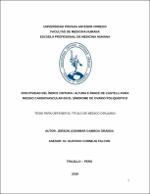| dc.contributor.advisor | Cornejo Falcon, Gustavo | |
| dc.contributor.author | Gamboa Granda, Jerson Joshimar | |
| dc.creator | Gamboa Granda, Jerson Joshimar | |
| dc.date.accessioned | 2019-08-13T20:25:49Z | |
| dc.date.available | 2019-08-13T20:25:49Z | |
| dc.date.issued | 2019 | |
| dc.identifier.uri | https://hdl.handle.net/20.500.12759/5261 | |
| dc.description.abstract | Objetivo: Determinar la efectividad del Índice cintura / altura y del Índice de
Castelli para valorar el Riesgo cardiovascular en el Ssíndrome de Ovario
Poliquístico en el Hospital de Apoyo Tomas Lafora - Guadalupe durante el
periodo 2018.
Material y métodos: Se llevó a cabo un estudio retrospectivo seccional de
pruebas diagnósticas en el que se incluyeron a 73 pacientes con síndrome
de ovario poliquístico, según criterios de selección los cuales se dividieron en
2 grupos: riesgo cardiovascular elevado o no elevado; calculándose el área
bajo la curva para el Índice cintura / altura y el Índice de Castelli.
Resultados: En la muestra estudiada la distribución del riesgo
cardiovascular según el score de Framingham fue el siguiente: riesgo alto 0
pacientes (0%); riesgo moderado 13 pacientes (18%) y riesgo bajo 60
pacientes (82%); la sensibilidad, especificidad, valor predictivo positivo y
valor predictivo negativo del índice cintura / altura en la predicción del Riesgo
cardiovascular incrementado en Síndrome de Ovario Poliquístico fue de
92%; 87%; 60% y 98% respectivamente; la sensibilidad, especificidad, valor
predictivo positivo y valor predictivo negativo del índice de Castelli en la
predicción del Riesgo cardiovascular incrementado en Síndrome de Ovario
Poliquístico fue de 85%; 83%; 52% y 96% respectivamente; la exactitud
pronostica del índice cintura/altura y del índice de Castelli fueron de 75% y
73% respectivamente.
Conclusión: El índice cintura / altura y del Índice de Castelli son efectivos
para valorar el Riesgo cardiovascular en el Ssíndrome de Ovario Poliquístico
en el Hospital de Apoyo Tomas Lafora - Guadalupe durante el periodo 2018. | es_PE |
| dc.description.abstract | Objective: To determine the effectiveness of the Waist Height Index and the
Castelli Index to assess the cardiovascular risk in Polycystic Ovarian
Syndrome at the Tomas Lafora - Guadalupe Support Hospital during the 2018
period.
Material and methods: A retrospective study of diagnostic tests was carried
out in which 73 patients with polycystic ovary syndrome were included,
according to selection criteria which were divided into 2 groups: elevated or
not elevated cardiovascular risk; calculating the area under the curve for the
Waist Height Index and the Castelli Index.
Results: In the sample studied, the distribution of cardiovascular risk
according to the Framingham score was as follows: high risk 0 patients (0%);
moderate risk 13 patients (18%) and risk under 60 patients (82%); the
sensitivity, specificity, positive predictive value and negative predictive value
of the waist / height ratio in the prediction of increased cardiovascular risk in
Polycystic Ovarian Syndrome was 92%; 87%; 60% and 98% respectively; the
sensitivity, specificity, positive predictive value and negative predictive value
of the Castelli index in the prediction of increased cardiovascular risk in
Polycystic Ovarian Syndrome was 85%; 83%; 52% and 96% respectively; the
prediction accuracy of the waist / height index and the Castelli index were
75% and 73% respectively.
Conclusion: The Waist Height Index and the Castelli Index are effective to
assess the cardiovascular risk in Polycystic Ovarian Syndrome at the Tomas
Lafora - Guadalupe Support Hospital during the 2018 period. | en_US |
| dc.description.uri | Tesis | es_PE |
| dc.format | application/pdf | es_PE |
| dc.language.iso | spa | es_PE |
| dc.publisher | Universidad Privada Antenor Orrego - UPAO | es_PE |
| dc.relation.ispartofseries | T_MED.HUMA_2613 | |
| dc.rights | info:eu-repo/semantics/openAccess | es_PE |
| dc.source | Universidad Privada Antenor Orrego | es_PE |
| dc.source | Repositorio Institucional - UPAO | es_PE |
| dc.subject | Índice cintura/altura | es_PE |
| dc.subject | Riesgo cardiovascular incrementado | es_PE |
| dc.title | Efectividad del índice cintura/altura e índice de Castelli para riesgo cardiovascular en el síndrome de ovario poliquístico | es_PE |
| dc.type | info:eu-repo/semantics/bachelorThesis | es_PE |
| thesis.degree.level | Título Profesional | es_PE |
| thesis.degree.grantor | Universidad Privada Antenor Orrego. Facultad de Medicina Humana | es_PE |
| thesis.degree.name | Médico Cirujano | es_PE |
| thesis.degree.discipline | Medicina Humana | es_PE |

